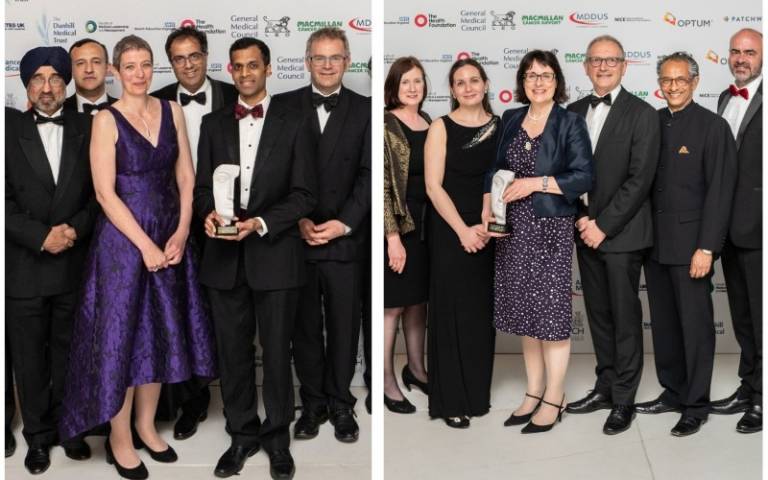UCL’s world-leading health pioneers recognised at BMJ awards
25 April 2019
Two UCL medical research teams have been recognised for their groundbreaking and pioneering healthcare work, winning national prizes at the prestigious 2019 BMJ awards.

UK Research Paper of the Year
The PRECISION trial, which found that an MRI scan and targeted prostate biopsies are significantly better at making a positive prostate cancer diagnosis than standard biopsies, won UK Research Paper of the Year. This research supported the National Institute for Health and Care Excellence’s (NICE) decision to recommend that all men at risk of prostate cancer receive an MRI scan ahead of a biopsy.
The award’s recipients included Professor Caroline Moore and Dr Veeru Kasivisvanathan (UCL Surgery & Interventional Science), Professor Mark Emberton (Dean of Faculty of Medical Sciences) and radiology colleagues Francesco Giganti (UCL Surgery & Interventional Science), Professor Shonit Punwani (UCL Centre for Medical Imaging) and Dr Clare Allen (UCLH).
Dr Kasivisvanathan, who is funded by a National Institute for Health Research (NIHR) Doctoral Fellowship and the first author of the study, said: “We are delighted to receive this recognition by the 2019 BMJ Awards judging panel for PRECISION, which is the first international multi-centre randomised trial to show the benefits of using MRI at the start of the prostate cancer diagnosis process.
“In men who need to have investigation for prostate cancer for the first time, PRECISION shows that using an MRI to identify suspected cancer in the prostate and performing a prostate biopsy targeted to the MRI information, leads to more cancers being diagnosed than the standard way that we have been performing prostate biopsy for the last 25 years.”
Professor Caroline Moore, Head of Urology at UCL and senior author of the study, commented: “We compared standard prostate biopsy to the use of MRI, offering targeted biopsies to only those men who had a suspicious MRI. The MRI pathway detected more harmful cancers that needed treatment, and it reduced overdiagnosis of harmless cancers, even though fewer men had a biopsy in the MRI arm.”
Dean of the UCL Faculty of Medical Sciences and study author, Professor Mark Emberton, said: “It is very humbling to see something (the introduction of imaging into the prostate cancer diagnostic pathway) that was started over a decade ago, get this kind of recognition.
“The award is a fitting tribute to the many hundreds of patients from all over the world who agreed to be randomised to MRI versus no MRI at a rate and with a confidence that none of us have seen before.
“The PRECISION consortium is a truly great example of team science. The award has concentrated our mind on focusing on the next most important question in relation to MRI and prostate cancer.”
The 2019 BMJ UK Research Paper of the Year Award, sponsored by NICE, recognises original UK research that has the potential to contribute significantly to improving health and healthcare.
Clinical Leadership Award
A team from UCL, from University College London Hospitals (UCLH), UCL and Great Ormond Street Hospital (GOSH) won the Clinical Leadership Award, for their pioneering surgery on abnormally developed spinal cords of babies in the womb. In October last year the team repaired the spine of Bethan Simpson’s baby, who was shown to have spina bifida during her 20-week scan. On 1 April this year, baby Elouise was born at UCLH and at two weeks old was doing well and showed no sign of the condition.
Award winners included, Professor Anna David, and Professor Donald Peebles (UCL Institute for Women’s Health and UCLH), Professor Paolo de Coppi (UCL GOS Institute of Child Health) and Professor Jan Deprest UCLH and University Hospitals Leuven.
Professor David said: “We’re delighted to win this award. It’s a superb endorsement of our recently launched Centre for Prenatal Therapy at UCL which is developing new treatments for babies in the womb before birth."
Before 2018, although fetal surgery was available across North America and in some continental European centres, UK parents interested in this option applied for specialist funding or self-funded the procedure abroad.
"The surgery is complex. There are two patients (mother and baby) requiring a multidisciplinary team involving fetal medicine doctors, midwives, obstetricians, neonatologists, radiologists, anaesthetists, paediatric neurosurgeons and neurosurgical scrub nurses,” said lead fetal surgeon Prof Deprest.
"This specialist fetal surgery gives the baby a significantly better chance in life, as compared to postnatal surgery, as babies with spina bifida are very often incapable of walking, and may require a series of operations to drain fluid from the brain (shunt placement) later in life” said lead neurosurgeon Dominic Thompson of GOSH.
The annual BMJ awards promote excellence in healthcare and recognise the inspirational work of healthcare teams across the country. The 2019 awards were held in London last night, Wednesday April 24, 2019.
Links
- BMJ Awards 2019
- Professor Caroline Moore
- Professor Mark Emberton
- Dr Veeru Kasivisvanathan
- UCL Surgery & Interventional Science
- Professor Anna David
- Professor Donald Peebles
- Professor Paolo de Coppi
- UCL Institute for Women’s Health
- UCLH
- GOSH
Image
Credit: BMJ
Media contact
Henry Killworth
Tel: 0207 679 5296
E: h.killworth [at] ucl.ac.uk
 Close
Close



